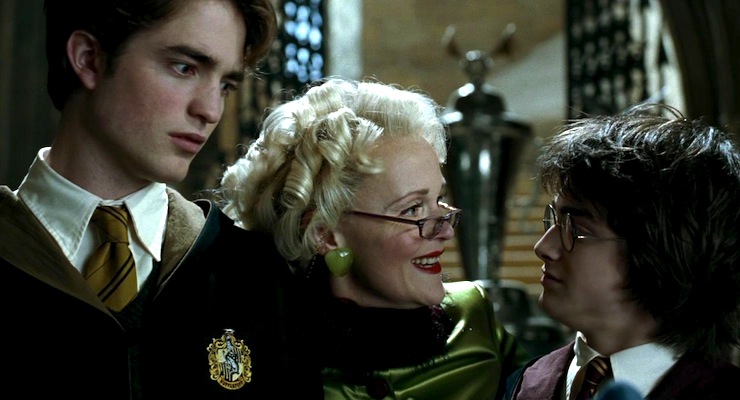It’s funny, because this movie has a… rocky relationship with Potter fandom. Some of the reasons why are warranted, others I’m not so sure on. But what’s odd to me on rewatching this time around is that the Goblet of Fire film was clearly trying to recreate Cuarón’s magic from PoA, and as a result has many of the same flaws; it has some beautiful added/altered moments and snappy dialogue, but the plot is a chopped up mess of a thing.
Of course, people are generally shouting over the color of Hermione’s dress too loudly to get that conversation in.
It seems relevant to start by saying that one of the movie’s greatest strengths lies in visual world building, very similarly to Prisoner of Azkaban. The Quidditch World Cup stadium, the Durmstrang ship and Beauxbatons coach, the costumes and props. The film is beautifully designed from Moody’s (now metal rather than wooden) leg and roving magic eye to the Triwizard Cup itself. And we see more of the student body again, the little side conversations, the antics of the Weasley twins, the crushes and whispers. There are so many satisfying moments in this film, which still makes it fun to watch in places even if the narrative has been shaved down like a sad little carrot.
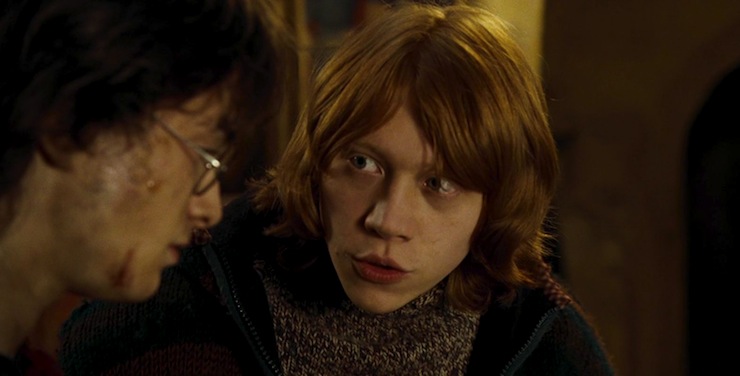
Where the trio is concerned, everyone has grown both in skill and height. It occurs to me that Hermione is weirdly combative through a good half of this film, though, and I feel as though it comes from the script being keen to show that Hermione is still the “tough, strong female” she was made out to be in the last film, then floundering where it has to juxtapose this with Hermione indulging in more classically feminine pursuits that the story demands. She’s beyond snippy with Harry and Ron for not waking up instantly at the beginning of the film, though there seems to be no reason for her irritation—she only just arrived at the house herself. Then she openly taunts Fred and George for trying the aging potion to get past the line around the Goblet of Fire, mocking them for thinking that Dumbledore could ever be fooled by something so dim-witted. Then she’s shouting at Harry: “You told me you had the egg figured out weeks ago!” and again, all the rage seems just a tad over-the-top. Maybe it’s just a slight overacting thing? I dunno, it threw me on this viewing.
And then there’s the hair problem. I mean, I know we’ve all had our share of unfortunate haircuts in youth, but I felt like they were determined to be extra mean to the boys on this round. Ron is needed back on the set of That 70s Show in a bad way. Why those styles in particular? Why did no one get a haircut this summer?
On the other hand, there is some major weirdness in the presentation of the international schools. The first problem comes from the decision to make them single-gender schools in the first place, which, who knows why anyone thought that was a good decision, but there you go. It results in introductions that border on the absurd. Dumbledore’s like “Here’s Beauxbatons!” and a bunch of ladies rush in doing coordinated dance moves, wearing satin-y-silk powder blue (excellent choice for school uniform fabric, wow) and breast hats. Then they sigh and proceed to fart butterflies before a single gymnast does some floor work to introduce Fleur, who bows like she’s being introduced to high society, or what-have-you.
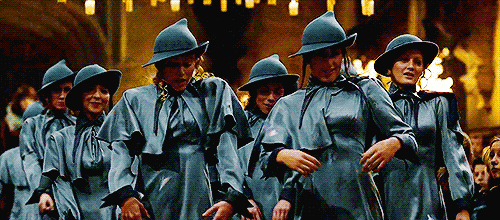
Followed by Durmstrang! Dudes. Dudes pounding floors with sticks. Big heavy sticks. These sticks represent masculinity. Thump go the sticks. In time. Dudes have rhythm. Now one of them will breakdance, the native movement style(??!!?) of Bulgaria. Another dude will breathe manly fire as Krum storms in, and he’s SUPER ANGRY, just so you know that testosterone has finally arrived at Hogwarts. Their uniforms are red, like the trail of blood they will leave from the door to the lake where their ship is parked after they dine on the bones of newly-sorted First Years.
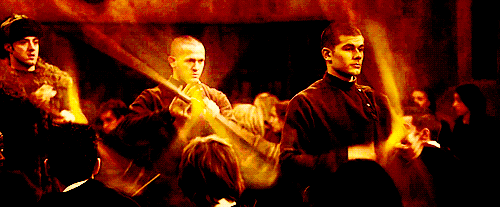
I get that some element of posturing could be part of the introductions when the Triwizard Tournament happens, and that’s fine. A sort of, “hey, you should be intimidated by how great we are!” show from the competing schools. But this is gendered in the goofiest way. I mean, really, those hats are boobs. Boob hats. You can’t not see it. It’s like they were trying to think of the clearest way to delineate Beauxbatons and Durmstrang, and the only thing they could come up with was “I dunno, Fleur was girly and fancy and Krum was big and broody, so we’ll just make everything about their respective schools align with that.” And Hogwarts comes off looking so well-adjusted by comparison, and you can’t help but think that if they were the ones traveling to some foreign school, they’d enter the opposition’s Great Hall singing the Hogwarts School Song and no one would ever take them seriously. I kind of want that now.
But whatever, the Triwizard Tournament is on like Donkey Kong and the odds are in no one’s favor—what can ya do?
One piece of this film that causes a great tizzy in fandom is Dumbledore’s furious reaction to Harry’s name getting spat out by the Goblet of Fire. There are many a GIF-ed shots and so forth, but I don’t think it’s worth the ire that line delivery gets. Or to be more accurate, I don’t think it’s particularly worthy of recounting unless we’re going to talk about the way in which Dumbledore’s entire character is altered in this film.

People act as though this is it, the one odd thing that he does, the one thing that’s in diametric opposition with his book!verse counterpart, and is therefore some kind of cardinal Potter Sin. But really, Dumbledore’s entire role in this film is changed from the book. He’s much more confused about what’s happening at the school. His lack of clarity on the events frustrates him to the point where he is willing to admit it. He bows to Crouch’s ruling that the Triwizard Tournament be held with Harry’s participation, but it seems as though he’d prevent it if he could. He passes the buck onto Crouch Sr. later, when McGonagall and Snape are questioning Harry’s involvement. Rather than Dumbledore taking the calculated risk of allowing Harry to compete, we are shown that Snape is the one who believes they should allow the events to unfold around the kid. It builds some suspicion around Snape while Dumbledore comes off looking far more helpless than he truly is. So while it is fun to snigger as Michael Gambon bellows “DIDYOUPUTYOURNAME IN DA GERBLET ERF FIAR?” that’s not an issue of bad acting choices so much as it is an issue of how the whole character is being relayed. The film is likely trying to keep Dumbledore in the role of sympathetic lovable grandpa, while the book version makes it clear that Dumbledore is playing a long game, aware of the danger he’s placing Harry in. Having him shout at Harry instead proves that he’s concerned because he is getting emotional i.e. he cares.
The distillation of the Barty Crouch Sr./Jr./Moody story makes for a very black-and-white telling of one of Rowling’s more layered emotional arcs. It’s really quite a shame because there’s no doubt at any point that this Barty Crouch Jr. isn’t evil with a capital ‘E,’ and it makes his father much more indiscernible for it. Crouch Sr. just seems unhinged and vaguely sad throughout the movie, rather than the cold, competent man who sent his pleading teenaged son to the worst prison on earth. Not to say that I’m sad to watch David Tennant chew scenery, but he could have played a more nuanced Barty equally well. The script simply didn’t want to spend time on it.
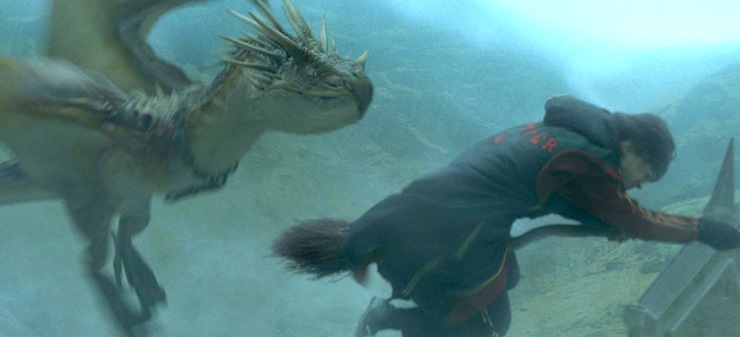
What the script did want to spend time on was the Triwizard Tournament. I understand the impulse from a filmmaking perspective, especially once they decided to make one movie out of the book instead of two—screenwriter Steve Kloves assumed it would be two films initially, but they never figured out how split the tale. The tournament is where all the action is, so distilling the story down and making it bend around the tournament is a logical step. Unfortunately, it results in making the tasks far more dark and perilous (and resultantly nonsensical) than they have to be. Harry fights a dragon and the dragon breaks free and proceeds to chase him all over the school, damaging the castle roofs, and everyone is just like, heyo, we’ll sit here in the stands because blah, we don’t need to know if Harry is currently being murdered by a dragon. We’ll see him when he gets back, and for now we’ll just hang out… quietly. No announcer for this part, huh? That’s cool. (Is it technically a wyvern if it uses its wings for leverage and has no front legs? I think that’s the general wisdom on dragon stuff, but I’m not sure.)
Then the second task shows the mermaids being considerably more hostile then they are in the book because Dramatic Tension, which is too bad because the mermaids being all cool and proud of Harry for saving peoples is way more interesting. Plus it deprived us of the chance to hear Dumbledore speak mermish, so that’s boo. The third task just gets whittled down to “maze with stuff in.” Not cool specific stuff like the book makes it out to be, just generic maze-y stuff. Mists! Vines! Darkness! WIND! Which is why Dumbledore has to make this contrived speech before they enter about how people “change” in the maze, because it wouldn’t seem all that threatening otherwise. Just maze-y.
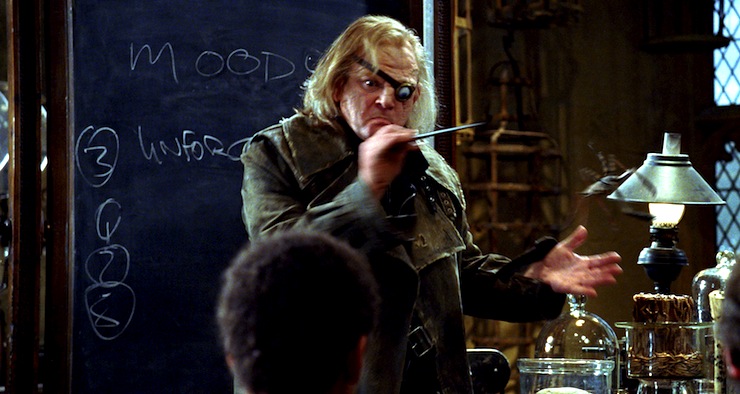
We’ve got a sizable addition to the cast this time around, and they’re predictably fabulous. Brendan Gleeson’s turn as Alastor Moody is one of the movie’s crowning achievements, as he brings the appropriate amount of menace and sheer bombasity that the character requires. The fact that Seamus talking about his magic eye under his breath in class results in Moody throwing chalk across the room is… someone give me a hand-fan so I can swoon over perfect characterization. There is anger there too, a constant rage boiling right under his skin that comes out in all the moments you wait for as a reader, like the ferret escapade and his breakdown to Harry at the end. The tongue tick is unfortunately a bit obvious, but it’s likely that was a higher up choice meant for extra clarity and clues. Miranda Richardson is both odious and impossible to look away from as Rita Skeeter, and it helps that her costumes are every bit as over-the-top as you’d expect from the book. Frances de la Tour is a charming and stylish Madame Maxime, and Clémence Poésy and Stanislav Ianevski are both well-cast as Fleur and Krum respectively.
But like I said, it’s the little bits that sell this movie. Ron waxing on about Viktor Krum while his family indulges his tirade with musical accompaniment. The dancing lesson with McGonagall (which should just be in the book, add it in I don’t even care). The way that Harry and Ron fight, and make it doubly hard on their friends and family by pulling them into it. Harry’s crush on Cho, how he makes himself look incomparably silly whenever he’s in her presence. The twins shoving off the whole Gryffindor common room so Harry and Ron have space to make up. Harry raising his eyebrows over Hermione’s comments about Viktor being a “physical being.” Snape smacking the boys with books when they talk during study period. (You can actually see Daniel Radcliffe trying not to laugh at one point during that scene.) Ginny being her sassy self, alotted more of a personality in this film than she than she ever will be again.
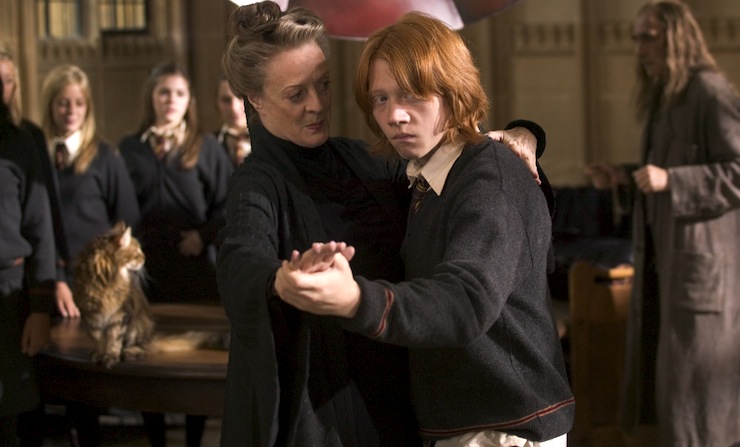
I love Harry hanging out with Neville in Ron’s absence, his exasperation over Neville’s constant exclamations of wonder without context. On the other hand, I have to admit that Harry’s reply of “Neville, you’re doing it again,” could really just read as GOSH, NEVILLE, I AGREED TO HANG OUT WITH YOU ONLY IF YOU PROMISED NEVER TO SPEAK IN MY PRESENCE, WHAT THE HELL. Which is also funny, really, so either way. Only thing is, with Dobby out of the picture, that makes it seem like Neville stole the gillyweed from Professor Snape for Harry to use in the second task. So Neville has been promoted Mission Impossible-style stealth master in this film and no one knows it.
Then there’s the Yule Ball, which gets me worse somehow in the film version, I think because the emotions are so immediate. Hermione isn’t just angry with Ron for his behavior, she’s fighting back tears, she’s in pain, and Ron’s clearly so out of his depth that he can’t come up with anything better than a sexist aside as Harry runs after him up the stairs. Hermione collapses on the staircase, pulling shoes off her aching feet, the rush at having a wonderful time with someone who made her feel special all dashed to pieces because someone who matters more tore her down. She crumples while the stragglers are having their last dance on the floor, and there’s a girl right behind her on the stairs in the exact same state with two friends desperately trying to comfort her, and it’s Too. Real. Every time I watch this scene I want to gather Emma Watson into my arms and murmur “It’s okay, everything will be okay” over and over and over.
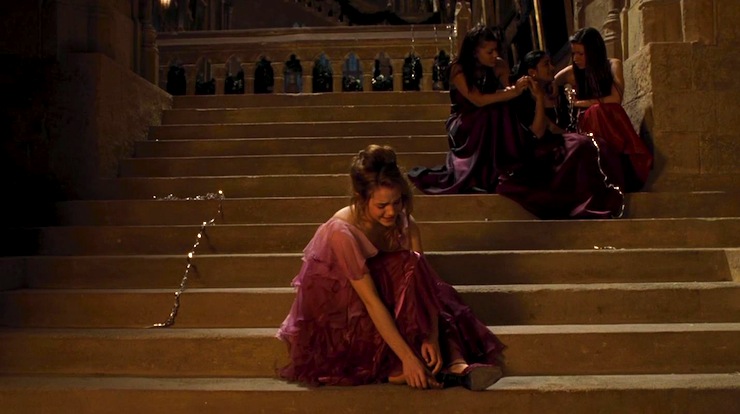
A word about the dress kerfuffle—fandom seems to have taken it very personally that Hermione’s dress was changed from periwinkle to a sort of muted rosy pink. And this is dumb for several reasons, being 1) it’s just a color 2) no one seems to care about the fact that she’s wearing a plain old dress and not dress robes, which annoys the heck out of me 3) no one seems to care that Harry’s robes are not “green matching the color of his eyes” the way they do in the book so Imma call a bullshit double standard what it is, and make it known that I could not give a melting chocolate frog butt what color Hermione’s dress happens to be. There. ‘Tis said.
For the fun, dance-y part of the ball, The Weird Sisters needed a real front band, and they got one. The band on film was made up of none other than Jarvis Cocker and members of Radiohead, Pulp, Add N to (X), and All Seeing I, with Cocker as the primary songwriter for the film. They’re pretty goofy numbers, but I cannot deny that if you played “Do the Hippogriff” at full volume, I would probably thrash around until I sprained my neck. Also, Franz Ferdinand were originally asked to play The Weird Sisters—they’re fans of the book—and I’m a little heartbroken that we never got to hear their version of wizard rock. (Interestingly, the group in the film and Warner Brothers were sued by the actual Canadian folk band Wyrd Sisters, but the band lost.)
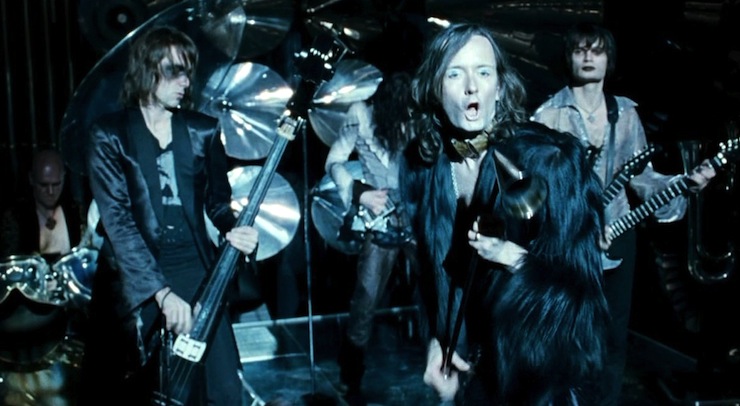
For all that the movie is always coming back to the tournament, the other champions feel weirdly sidelined, and we see very little of Fleur and Krum. (A little more of Krum, but only as he relates to Hermione.) Cedric Diggory, of course, is played by Robert Pattinson, before Twilight mania made him a household name. It’s sort of strange to watch him here and see how much more comfortable he seems in this role than he ever will as Edward Cullen. I never liked the fact that they have him raise his wand before his death in the film because I think it ruins some of the impact, but it’s the sort of “movie choice” that you expect nonetheless. He’s a wonderful Cedric, effortlessly handsome and bright and sweet.
On the other end of the spectrum we’ve got Ralph Fiennes, in my mind, the perfect choice for Voldemort’s final casting. Fiennes manages to capture the extreme highs and lows of a figure who is drunk of his own grandeur, and it never really seems as though he’s putting it on or going too far over the top. (Can you go too far over the top with Voldemort?) The vocal register he chose takes inspiration from Rowling and puts it to excellent use; light and airy, as though he means for you to strain to hear him. The fact that they managed to create a look in makeup and CGI that is both snakelike and workable was such a shock to me the first time I saw the film.
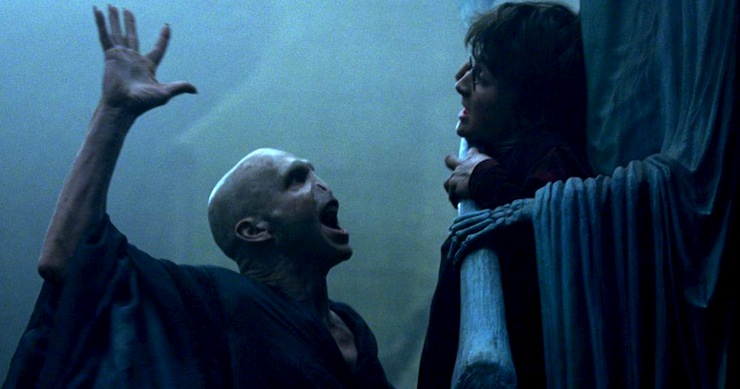
The stand-off between Harry and Voldemort in the graveyard is a bit rushed (they really could have built up more to the reveal of James and Lily), but at least its clear enough to understand. The reentry to Hogwarts following it is perhaps one of the most visceral pieces of the film series. Daniel Radcliffe delivers on Harry’s pain and shock with interest, his most impressive performance in the films up until this point. The choice to zero in on Amos Diggory’s reaction to Cedric’s death is raw and startling, perhaps for its lack of commonplace; movies tend to hone in on the grief of mothers when it comes to children, and even when men are permitted reaction to that kind of loss, it’s often a subdued thing.
Gambon destroys me on the “Remember Cedric Diggory” speech even though the camera spends the majority of it focused on the students and their reactions. The tremor of his voice is honestly all it takes to bring everything home.
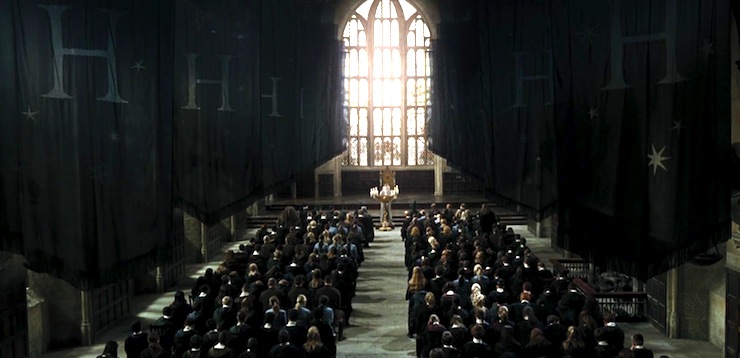
And then the movie ends on some really terrible dialogue that’s meant to put the whole story into perspective, but really just comes off as “we weren’t sure how to put a button on this, and we weren’t going to bring Hagrid in at the last second to talk about facing the future, so here’s some stilted dialogue that our poor teenage actors really don’t know what to do with”—
Hermione: Everything is going to change now, isn’t it?
Harry: …Yes.
I mean, it’s not a smudge-screen fade-to-black, but it’s honestly not much better.
Emmet Asher-Perrin honestly thinks it’s all worth it for the moment where Cedric asks Harry how he’s doing, and Harry just deadpans “spectacular.” You can bug her on Twitter and Tumblr, and read more of her work here and elsewhere.










